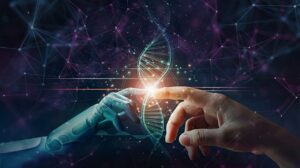
The world of healthcare is going through a significant transformation with the rise of Artificial Intelligence (AI). This ground-breaking technology transforms how we detect and diagnose diseases. It enables healthcare professionals to identify them at their earliest stages and intervene with more effective treatment plans. This article delves into the fascinating world of AI-powered early disease detection, exploring its potential to revolutionize medicine and save countless lives.
The Glaring Problem of Late-Stage Disease Detection
Many diseases remain undetected until they reach advanced stages, significantly impacting treatment efficacy and patient survival. This often leads to:
- Limited therapeutic options: Advanced diseases often respond less favorably to treatment, leaving patients with fewer options and potentially less effective outcomes.
- Higher healthcare costs: Late-stage diagnoses necessitate more intensive and costly treatment regimens, burdening healthcare systems and individuals.
- Emotional distress and reduced quality of life: Late-stage diagnosis can be emotionally devastating for patients and their families, leading to anxiety, depression, and a diminished quality of life.
Early diagnosis, however, presents a powerful solution. It allows for:
- Timely intervention: Early identification of diseases allows healthcare professionals to initiate treatment sooner. This improves the chances of successful intervention and remission.
- Personalized treatment plans: Tailoring treatment to the specific characteristics of the disease at its early stages can lead to more effective and patient-specific care.
- Improved patient outcomes and survival rates: Early diagnosis and intervention are directly linked to improved patient outcomes and higher survival rates.
- Cutting healthcare expenses: Detecting and treating a medical condition early can significantly lower the overall cost of managing the disease. This is achieved by minimizing the necessity for more intensive interventions in the later stages.
AI: A Game Changer for Early Disease Detection
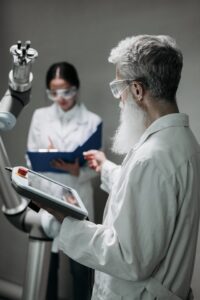
AI can sift through enormous amounts of data and recognize subtle patterns, revolutionizing the early detection of diseases. By leveraging its capabilities, AI can:
- Analyze medical images with exceptional accuracy: AI algorithms can analyze mammograms, chest X-rays, and skin lesions with remarkable accuracy, leading to earlier cancer detection and improved survival rates.
- Spotting subtle biomarkers in blood tests and other data: AI can predict the risk of developing diseases like heart disease, diabetes, and Alzheimer’s. This is achieved by scrutinizing blood tests, genetic information, and other relevant data. This empowers individuals and healthcare professionals to take preventive measures.
- Analyzing medical records and recognizing trends: AI can sift through extensive medical records, pinpointing patterns and anomalies that might signal the presence of a disease in its earliest stages, even before apparent symptoms surface.
Beyond Diagnosis: AI’s Impact on Healthcare Systems
AI’s benefits extend beyond accurate diagnosis, impacting various aspects of healthcare systems:
- Improved data analysis and decision-making: AI can analyze complex medical data sets, empowering healthcare professionals with insightful information for clinical decisions. This capability enables the optimization of treatment plans tailored to individual patients.
- Resource allocation and optimization: AI can predict patient needs and optimize workflows, enabling hospitals to allocate resources more efficiently and effectively.
- Improved patient monitoring: Wearable devices and sensors powered by AI can constantly check vital signs and health metrics. This enables the early detection of potential complications, allowing for timely intervention.
- Personalized medicine:
Revolutionizing Early Detection for Specific Diseases
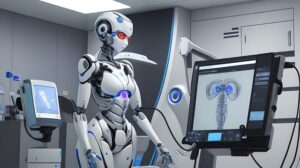
AI’s impact extends beyond general diagnostics, demonstrating the promising potential for specific diseases:
- Cancer: AI algorithms excel at analyzing medical images, notably boosting the early detection of different cancers like breast, lung, and colorectal. This leads to early intervention and personalized treatment plans, ultimately enhancing patient survival rates.
- Heart Disease: AI can analyze electrocardiograms (ECGs) and other data to spot subtle signs of heart issues before symptoms surface. This enables the implementation of preventive measures, lowering the risk of heart attacks and other cardiovascular events.
- Alzheimer’s Disease: Early diagnosis of Alzheimer’s disease is crucial for managing its progression. AI can analyze brain scans and other data to identify early disease markers, allowing timely intervention and potential therapies to slow its progression.
- Stroke: AI algorithms can analyze medical data points to predict the risk of stroke. This enables individuals and healthcare professionals to take preventive measures and prepare for potential emergencies.
Challenges and Opportunities: Paving the Way for Responsible AI Development
While AI offers immense promise for early disease detection, challenges remain that need to be addressed:
- Ethical considerations: Ensuring fairness, transparency, and accountability in AI development and deployment is crucial. This is essential to avoid bias and discrimination in healthcare.
- Data privacy and security: Addressing data privacy and security concerns is essential to ensure patient trust and ethical AI implementation.
Addressing the Challenges and Embracing the Future
Bridging the Talent Gap:
Addressing the talent gap requires a multi-pronged approach:
- Investing in education and training: Universities, research institutions, and healthcare organizations can collaborate to develop comprehensive AI training programs for healthcare professionals.
- Encouraging interdisciplinary collaboration: Fostering collaboration between AI experts and healthcare professionals is crucial to bridge the knowledge gap and ensure the development of clinically relevant AI applications.
- Promoting diversity and inclusion: Actively encouraging participation from diverse backgrounds in AI development will ensure that AI-powered healthcare solutions are inclusive and equitable.
Ensuring Accessibility and Affordability:
Making AI-powered early detection technologies accessible and affordable to all populations is critical for equitable healthcare access. Strategies include:
- Developing open-source AI tools and algorithms: Open-source resources can facilitate broader adoption and adaptation of AI technology in resource-limited settings.
- Implementing cost-effective solutions: Exploring cost-effective data collection and analysis methods can help reduce the overall cost of AI-powered early detection.
- Establishing partnerships and funding mechanisms: Collaborations between governments, healthcare organizations, and technology companies can facilitate investment in AI research and development for under-resourced communities.
The Future of Early Disease Detection with AI: A Brighter Horizon
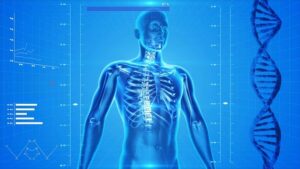
The future of AI in early disease detection holds immense promise. Here are some exciting possibilities:
AI for Drug Discovery and Development:
- AI can accelerate the identification of new drug targets and develop effective treatments for various diseases, leading to faster and more effective therapies.
- AI-powered drug screening can personalize treatment plans based on individual genetic and health data, leading to more effective patient outcomes.
AI-Powered Wearable Devices and Sensors:
- Continuous health data monitoring through wearable devices and sensors will provide valuable insights for early disease detection and personalized healthcare management.
- AI can examine data collected from wearable devices to recognize subtle changes in health parameters. This capability allows for early intervention, helping to prevent potential complications.
Robotics in Healthcare:
- AI-powered robots will assist surgeons in complex procedures, improving precision and minimizing human error.
- AI-powered robots can perform repetitive tasks, freeing healthcare professionals to focus on patient care and interaction.
- AI-powered robots can offer personalized and adaptable therapy programs for patients recovering from injuries or illnesses.
Conclusion: A Brighter Future for Early Disease Detection with AI
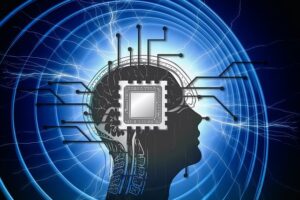
AI holds the transformative potential to revolutionize early disease detection, ushering in a brighter era for healthcare. By empowering earlier diagnosis and intervention, AI can:
- Improve patient outcomes and survival rates across various diseases.
- Reduce healthcare costs by minimizing the need for intensive interventions in later stages.
- Empower individuals to take control of their health by providing them with personalized risk assessments and preventive measures.
Yet, the complete benefits of AI can only come to fruition through responsible development and implementation. Addressing ethical considerations, fostering collaboration between stakeholders, and investing in research and development is crucial to ensuring that AI is a force for good healthcare.
As AI research and development speed up, blending AI with other advanced technologies such as genomics, big data analytics, and nanotechnology will deepen our grasp of disease mechanisms. This synergy is set to open the doors to genuinely personalized medicine.
By embracing AI and fostering its responsible development, we can create a healthier future where early disease detection becomes the norm, enabling individuals to live longer, healthier, and happier lives.
